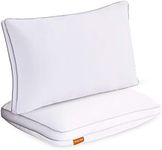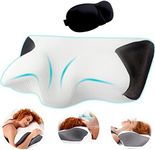Buying Guide for the Best Anti Snore Pillows
Choosing the right anti-snore pillow can significantly improve your sleep quality and overall health. These pillows are designed to help reduce or eliminate snoring by promoting better alignment of your head, neck, and airways. When selecting an anti-snore pillow, it's important to consider various factors that can affect its effectiveness and comfort. Here are some key specifications to look for and how to choose the best one for your needs.MaterialThe material of the pillow is crucial for comfort and support. Common materials include memory foam, latex, and polyester. Memory foam is known for its contouring ability, providing personalized support by molding to the shape of your head and neck. Latex is durable and offers firm support, which can be beneficial for maintaining proper alignment. Polyester pillows are generally softer and more affordable but may not offer the same level of support. Choose a material that feels comfortable to you and provides the necessary support to keep your airways open.
Shape and DesignAnti-snore pillows come in various shapes and designs, such as wedge-shaped, contoured, or cervical pillows. Wedge-shaped pillows elevate your upper body, which can help reduce snoring by preventing your tongue from falling back into your throat. Contoured pillows have a curved design that supports the natural curve of your neck and head, promoting better alignment. Cervical pillows are designed to support the neck and head specifically, which can help keep your airways open. Consider your sleeping position and choose a shape that will provide the best support for you.
FirmnessThe firmness of the pillow affects how well it supports your head and neck. Pillows can range from soft to firm. Soft pillows may feel more comfortable but might not provide enough support to keep your airways open. Medium-firm pillows offer a balance between comfort and support, making them a good choice for many people. Firm pillows provide the most support, which can be beneficial for keeping your head and neck aligned. Consider your personal preference and any neck or back issues you may have when choosing the firmness level.
Height and LoftThe height or loft of the pillow refers to how high it raises your head. Pillows with higher lofts can help keep your airways open by elevating your head and neck. However, if the pillow is too high, it can cause discomfort and strain on your neck. Low-loft pillows are better for stomach sleepers or those who prefer a flatter pillow. Medium-loft pillows are suitable for most people and provide a good balance of elevation and comfort. Choose a pillow height that aligns with your sleeping position and provides the necessary support to reduce snoring.
BreathabilityBreathability refers to how well the pillow allows air to circulate, which can affect your comfort and temperature regulation during sleep. Pillows made with breathable materials, such as memory foam with cooling gel or latex, can help keep you cool and comfortable throughout the night. Breathable pillows are especially important for those who tend to sleep hot or live in warmer climates. Look for pillows with breathable covers or materials to ensure a comfortable sleep environment.
AdjustabilitySome anti-snore pillows offer adjustability features, such as removable inserts or adjustable loft. These features allow you to customize the pillow to your specific needs and preferences. Adjustable pillows can be beneficial if you find that your needs change over time or if you want to experiment with different levels of support and comfort. Consider whether you would benefit from an adjustable pillow and look for options that offer this feature.
















